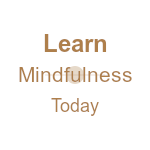How to Make Peace with Uncertainty—One Ritual at a Time

“Rituals are the formulas by which harmony is restored.” ~Terry Tempest Williams
Life doesn’t come with an instruction manual.
One day, it’s a relationship you thought would last. Another, it’s a career path that suddenly dissolves. A health scare. A financial setback. Aging parents. A terrifying diagnosis. A global pandemic.
If you’re lucky, you haven’t experienced all these—yet. But let’s be honest: we are all living in the liminal.
The space between what was and what will be is where most of life actually happens. Yet we rarely talk about how to be there. We try to optimize or escape, hustle or numb—anything to avoid the discomfort of not knowing.
But here’s the surprising truth: making peace with uncertainty isn’t about having more control. It’s about learning how to ride the waves instead of being pulled under by them.
And this is where ritual offers its quiet power.
Not necessarily the capital-R kind that requires incense and Gregorian chants—though those can work, too. I mean small, intentional actions that create a rhythm for your day, ones that help you feel grounded even when the ground feels shaky.
Ritual as Refuge
When my father died unexpectedly, I learned firsthand how ritual can hold you when nothing else makes sense. In the chaos of grief, it was the mourning rituals of our community—the wakes, the casserole meals, the familiar hymns filling the church—that kept us afloat.
These weren’t grand solutions. They didn’t fix the pain. But they gave it shape. And that shape gave us something to hold onto.
That’s the gift of ritual.
Even now, in the most ordinary parts of my life, ritual keeps me tethered when the world is spinning.
Sometimes it’s lighting candles for a weeknight dinner, and other times it’s stepping outside for a “noticing walk”—just a few minutes spent paying attention to the natural world around me. These rituals might look simple on the surface, but underneath, they’re working hard, stitching meaning into my day and helping me to remember who I am.
Why Ritual Works When Life Falls Apart
There’s a reason that rituals have been practiced across every known culture. Some anthropologists even consider ritual to be the cornerstone of civilization. Rituals help us mark time, create order, and tap into meaning—even when the future feels wildly out of reach.
Unlike habits, which aim for efficiency, or routines, which often become mindless, rituals ask for your presence. They carry emotional weight. And they don’t have to be long or elaborate, but what they do require is intention and reverence.
That morning walk with your dog? It can become a ritual if you treat it as a moment to breathe, notice the sky, and anchor into the now. Lighting a candle before bed. Saying a blessing before a meal. Writing a three-line journal entry each evening.
These are not “life hacks.” They’re reminders that even in times of chaos, you still get to choose how you show up. And that choice—however small—is powerful.
Ritual Isn’t About Perfection—It’s About Presence
One of the biggest misconceptions about ritual is that it has to be rigid. But rituals can—and should—evolve. They aren’t meant to control life but to help us meet it with steadiness. They can also be fun!
Rituals gain meaning not just from repetition but from what they’re rooted in. That’s why I encourage people to connect their ritual practice to a personal “North Star”—a set of core values or a vision for who they want to be in the world. When the external world feels chaotic, this internal compass becomes essential. Even the smallest ritual, when aligned with your deepest values, can become a powerful act of coherence.
I often say, “You don’t need more time. You need more intention.” Just a few minutes of conscious action, aligned with your values, can shift your whole experience of the day.
Especially when the day is hard.
That’s the quiet gift of ritual: it won’t remove uncertainty, but it will remind you who you are meant to be in the face of it.
The Neuroscience Behind Rituals
There’s also something deeply physiological happening with ritual. When we engage in intentional, values-driven actions—especially those with structure and sensory richness—we begin to rewire our brains.
Neuroscientists call this neuroplasticity. Repeating actions with emotional meaning strengthens neural pathways and helps us build resilience. Rituals aren’t just symbolic. They are embodied tools for transformation.
Even the structure itself has benefits. Just a few minutes of focused, positive experience each day can begin to shift how we feel—and how we function.
How to Begin
If life feels unpredictable right now (and even if it doesn’t), try this:
Choose one part of your day you can reclaim—a moment that already exists. Maybe it’s the minute before your morning coffee, the transition between work and dinner, or the final few breaths before sleep.
Add a layer of intention to it. A breath. A word. A gesture. A prayer. A pause.
Then go one step further: connect that moment to your core values.
Ask yourself: What intention do I want to bring to this part of my day? Maybe it’s compassion. Maybe it’s strength. Maybe it’s a simple commitment to being present.
Let that idea guide how you show up in your ritual. You could even write it down or say it aloud. When your ritual reflects your core values, it becomes more than just a habit—it becomes a practice of alignment.
Need help identifying those values? Ask:
- How do I want to show up in this moment?
- What would my highest self do here?
- What really matters to me—when all the noise falls away?
Repeat your ritual every day. Not rigidly, but reliably.
Then notice what shifts.
You may still be in the unknown, but you won’t be untethered. You’ll have created a sacred pause. And in that pause, you might find the steadiness you didn’t know you had.
Ritual as Resistance—and Renewal
In a culture that values productivity over presence, taking time to ritualize your day can feel radical. But it’s also deeply restorative. Ritual reminds us that we are not machines. We are humans, longing for connection, coherence, and care.
Whether you’re lighting a candle or taking a breath, whether your ritual is silent or sung, solo or shared—it matters. Not because it will solve every problem, but because it helps you face those problems with clarity and heart.
In uncertain times, ritual won’t hand you a map.
But it will remind you where your compass is.
![]()
About Kris Farren Moss
Kris Farren Moss is a Stanford-educated author and coach who helps people create meaningful rituals for connection and purpose. Her book, Your Guide to Ritual Design, blends personal reflection with practical wisdom, drawing on her Irish Catholic roots and deep curiosity about how humans make meaning.
Get in the conversation! Click here to leave a comment on the site.



